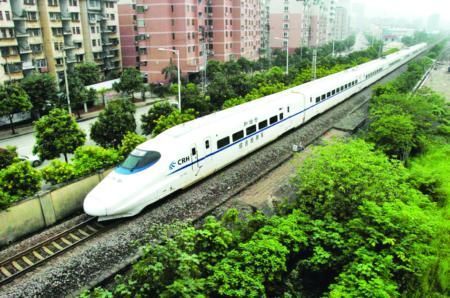


High-Speed Railway and China's Future
By Gao Bo(高柏), social science professor with Duke University in America
Observer, page 41, issue 510, March 14, 2011
Chinese media have been criticizing high-speed rail projects for mainly three reasons: first, the projects have incurred huge debts, amounting to 1.3 trillion yuan, while the railway system’s entire asset only stands at 2.46 trillion yuan. Second, local governments are developing high-speed rails without scientific planning and it’s not reasonable for underdeveloped areas to pursue high-speed rails. Third, the high speed train operation can hardly be self-sustained, as the occupancy rate is still low.
However, the author argues that high-speed rails are investment-worthy, as it will benefit China in three aspects. First, it will link China via land to foreign countries and eventually form new economic circles along the rail lines. Second, it will be beneficial to the economic integration of Asia and Europe, which, in turn, will offer new driving force for global economy and help China to shift from its current export-driven economic model to a domestic-demand-driven. Third, China may act as a financial hub connecting Asia and Europe once a global high-speed rail networking is established, with China serving as its center.
Original article: [Chinese]

Much Ado Do About Low Carbon"
By Xue Zhaofeng(薛兆豐), researcher with the National Development Research Institute, Peking Univeristy
Observer, page 43, issue 511, March 13
Low carbon has become a hot topic across the world, but some key questions remain unsolved. Firstly, no consensus has been reached so far on whether global warming is linked to the increased carbon dioxide in the air. Secondly, it's unclear whether human activities influence the earth’s temperature, which is shaped by so many factors. Thirdly, carbon dioxide is not the only pollutant human emits into the air. While carbon dioxide may cause earth temperature to go up, another pollutant, sulfur dioxide will lead to its decrease. Last but not least, it’s unclear whether temperature has a cold-warm cycle, and if it does, the author thinks it’s meaningless to discuss "low carbon".
Original article: [Chinese]

Stop Intimidating Journalists
By Wuyue Sanren(五岳散人, columnist and well-known Chinese blogger
Economic Observer Online
Offering cash disguised as "transportation allowance" (車馬費) to reporters is a common practice for Chinese companies hoping to get their news into the media. Economic Observer reporter Chen Yong has exposed and taken a swipe at the “norm” on his Sina micro blog recently, naming corporate figure Liu Yonghao in the post.
The micro blog post sparks controversy, as Liu is a member from the top political advisory body, founder of Hope Group and one of the richest men in China. Later, the reporter, Chen, was humiliated by the Hope Group personnel, who insisted on presenting him a "gift" in the form of a toothbrush – which is meant to say:”clean your mouth before you speak.”
The author, a senior press person, says in the past, when journalists stepped on the toes of some powerful figures, they received threats and even physical intimidation. As time goes by, the manner of intimidation becomes more subtle and "civilized", such as delivering humiliating message by sending gifts like mouth wash, toothpaste, and toothbrush to the journalists in question.
The author says in jest that self-defense classes should be included in journalism course, so that reporters learn to guard themselves from various powerful figures. The author stresses that due to the close ties between some corporate figures and officials in China, intimations issued by corporate sector could be very real and dangerous. Perhaps, he jokes, journalists should be armed.
Original article: [Chinese]
For the English version of the "toothbrush scandal":
Quality of Life Include Personal Freedom and Rights
By Wei Liming (魏黎明), Economic Observer reporter
Economic Observer Online
One of the major tasks for the Chinese government this year is to improve the quality of life for Chinese. To accomplish that, we first need to define the standards use in evaluating quality of life.
In the past, some of the indicators used in measuring quality of life include food, clothing, housing and life expectancy rate. However, the author thinks that as the society advances, demands for safeguarding personal freedom and rights will soar, and these should also be included as index for quality of life.
He thinks that a government should protect the interest of the people, and that include ensuring personal rights to hold properties. Thus, demolition and relocation projects should be handled in a just manner, such as offering reasonable compensation based on market rate.
Government transparency and the public rights to information are important too, as a stable society is build on trust, but the people need to be in the know to monitor government behavior and expenditure in order to build trust. Social conflicts could arise from mistrust, and conflicts could erode quality of life.
Original article: [Chinese]
Punitive Clause in Charity Contract, What does it Mean?
By Qi Yue (啟越), Economic Observer reporter
Economic Observer Online
Cao Dewang, founder and board chairman of Fuyao Glass Group, has made himself a focus of the media by signing a contract with the China Foundation of Poverty Alleviation, requiring the latter to report the progress of his 200-million-yuan’s donation project. The contract also says, if the latter fails to comply with additional conditions lay down in the contract, Cao Dewang will demand for compensation.
This is the first time for a Chinese philanthropist to include punitive clause in charity contract. While it does indicate a growing trend for Chinese elites to make contribution to the society, it also implies that China’s charity system needs reexamination.
Last year, when Qinghai earthquake erupted, the Chinese government required all the 13 charity funds involved in aftermath assistance to transfer their donations to a designated account so that government may use them to finance re-construction. The move has triggered doubts among the public, as they fear the donations will turn into a form of "government capital".
Original article: [Chinese]